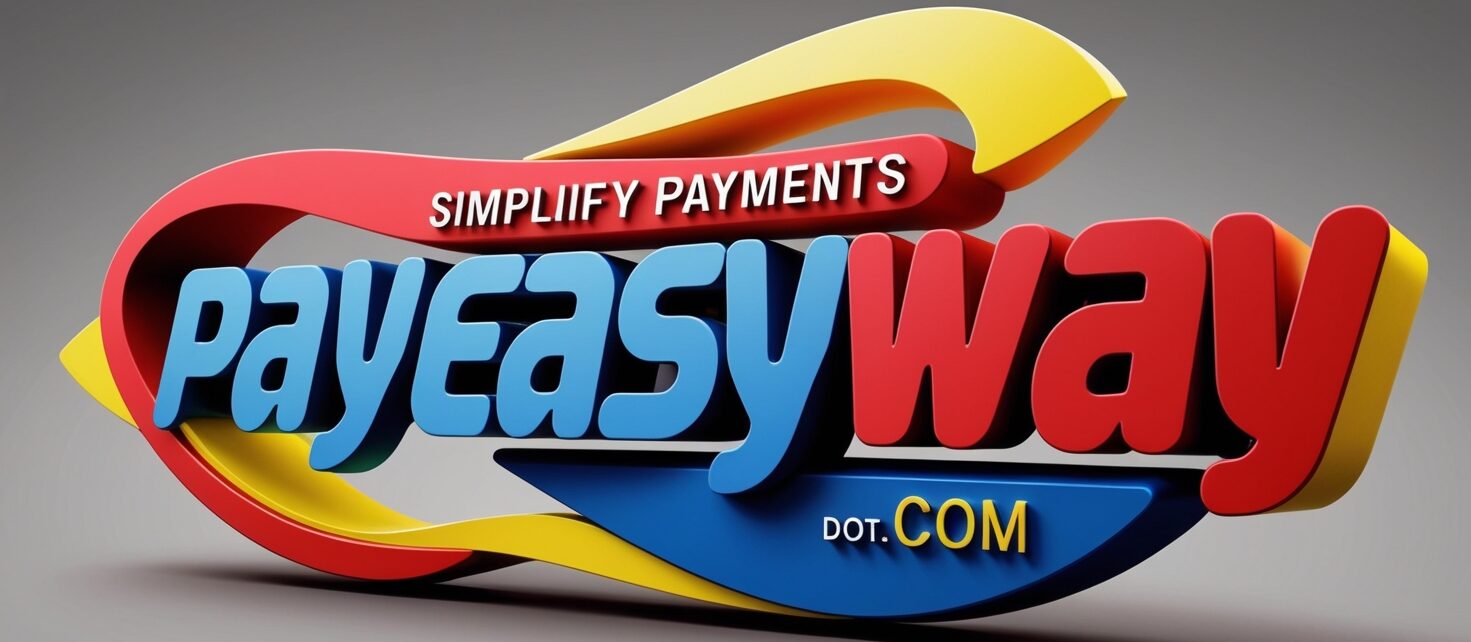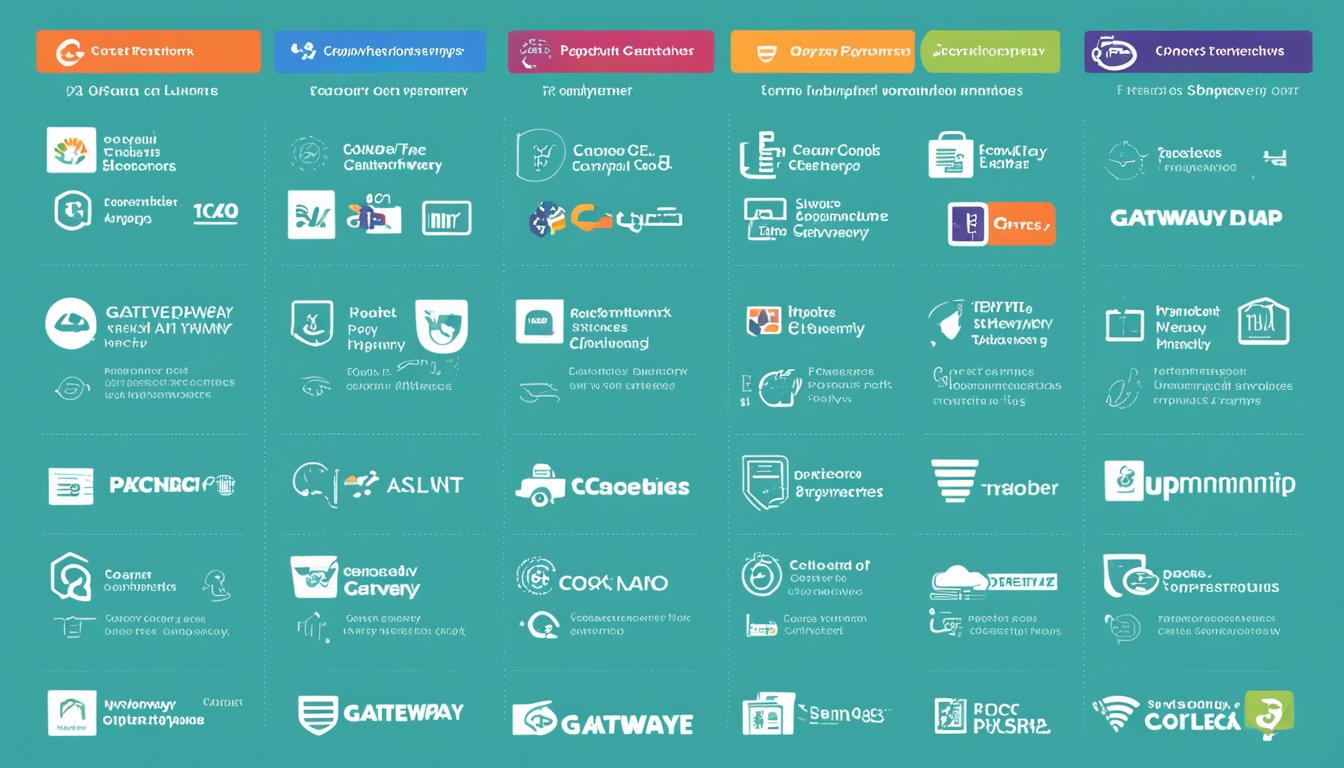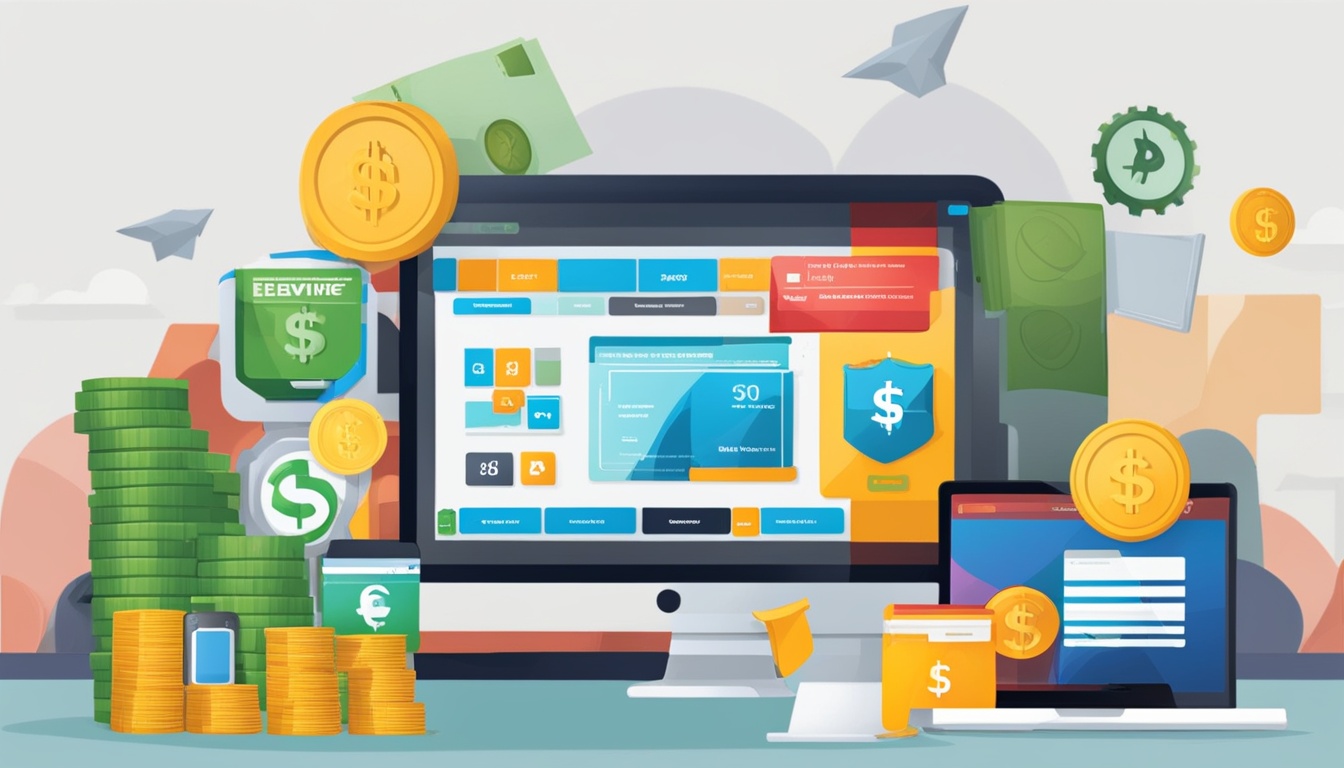In today’s digital world, choosing the right payment processing company is key for businesses. But which ones are the best in 20241? Look for companies with fair rates, useful features, great customer service, and easy integration with your software1.
Top companies like Square, Shopify, and Finix lead the way. Square has a flat-rate pricing model and free POS software, perfect for physical stores1. Shopify is unmatched in e-commerce platform integration, and Finix offers low interchange-plus rates1.
Helcim gives discounts for big businesses, Stripe is great for online and international transactions, and Chase Payment Solutions offers direct network access and free plans1.
Key Takeaways
- Explore top payment processing companies like Square, Shopify, and Finix for their competitive rates, seamless features, and exceptional customer service.
- Consider factors such as pricing models, integration capabilities, and security when choosing a payment processor for your business.
- Discover specialized solutions like Helcim’s volume discounts and Stripe’s international transaction capabilities.
- Understand the importance of PCI compliance and integration with your business software when selecting a payment gateway.
- Stay informed about the latest trends and innovations in the payment processing industry to make the best decision for your business.
Understanding Payment Processing Solutions for Modern Business
In today’s world, payment processing has changed a lot. It now meets the needs of all kinds of businesses, from old-fashioned stores to online shops. There are many payment solutions that make transactions safe and easy2. In the last six years, online shopping has doubled, showing how important good payment systems are2.
Types of Payment Processing Systems
There are three main types of payment systems: redirect, hosted, and self-hosted2. Online stores use payment gateways to get the info they need for payments2. Each system has its own way of working, security, and how well it fits with other systems. This lets businesses pick the best one for them.
Key Features of Payment Processors
When picking a payment partner, businesses need to look at a few key things. These include how much it costs, how easy it is to use, how it can be customized, and how safe it is3. POS systems can be pricey, especially for small businesses3. So, it’s important to think about the cost of payment solutions.
Security and Compliance Standards
2 With globalization, businesses can work all over the world2. They need secure payment systems that follow strict rules, like PCI-DSS2. These rules help keep customer data safe and reduce the risk of fraud and cyber attacks.
2 Now, people mostly use cards and online payment services like Venmo and PayPal2. This makes it crucial to have payment systems that are easy, safe, and up-to-date2. Businesses can sell products anywhere, needing tech that makes payments easy2. The internet makes shopping faster and easier, and modern payment systems let people buy things all over the world quickly2. Payment processors connect customers with their banks and merchants with theirs, making transactions smooth2. Businesses can choose between custom systems or ready-made ones, depending on what they need.
| Payment Processing Feature | Importance for Businesses |
|---|---|
| 3Credit card terminals | 3Essential for businesses that accept card payments |
| 3Smart terminals | 3Offer additional features such as touchscreen interfaces and integration with business management software |
| 3Payment gateways | 3Ensure secure transactions for e-commerce businesses |
| 3Mobile wallets | 3Provide convenience and security for customers |
| 3Mobile card readers | 3Lightweight, easy to transport, and ideal for businesses operating outside traditional retail environments |
| 3API integration | 3Allows businesses to create customized payment solutions aligned with their specific needs |
| 3Cryptocurrency payments | 3Offer low transaction fees and appeal to tech-savvy consumers |
3 When choosing a payment solution, businesses should think about what payments they accept, how many transactions they do, their security needs, and what their customers like4. In 2023, the most common payment at POS systems in the U.S. was credit cards, followed by debit cards4. Mobile wallet payments were third, and they’re expected to pass debit cards by 20274. PayPal is seen as a big name in online payments by 78% of U.S. consumers.
Top Payment Processing Companies in 2024
Businesses of all sizes need to keep up with the digital world. In 2024, top payment service providers and credit card companies will change the game. They will bring new features and reliable services5.
Square is a leader with its flat-rate pricing and free POS software. It’s great for brick-and-mortar shops5. Stripe is best for online sales, supporting many currencies. PayPal is known for its ease and wide acceptance, making it a top choice for businesses5.
Shopify Payments works well with the Shopify platform, perfect for online sellers. Helcim offers volume discounts and interchange-plus pricing for more flexibility. National Processing, Stax by Fattmerchant, and U.S. Bank Merchant Services also lead the way, each with their own features and pricing5.
| Payment Processor | Pricing Model | Key Features |
|---|---|---|
| Square | Flat-rate pricing | Free POS software, mobile payments |
| Stripe | Customizable pricing | Online transactions, multi-currency support |
| PayPal | Tiered pricing | Simplicity, wide acceptance |
| Shopify Payments | Flat-rate pricing | Seamless integration with Shopify |
| Helcim | Interchange-plus pricing | Volume discounts, flexible pricing |
The payment processing world is always changing. Each top provider offers unique solutions for businesses5. Knowing what each offers helps businesses choose the best for their needs in 2024 and beyond.
“The right payment processing solution can make or break a business in today’s digital economy.” – John Doe, CEO of ABC Enterprises
Online Payment Processing Companies: Comparing Industry Leaders
In the world of e-commerce, Square, Stripe, and PayPal are leaders. Each offers different features and pricing. They meet the needs of businesses online6.
Square vs Stripe vs PayPal
Square charges 2.6% + $0.10 for in-person and 2.9% + $0.30 for online transactions6. Stripe focuses on developers, offering 2.9% + $0.30 for online transactions. It also has tools for custom websites and apps6. PayPal’s fees start at 3.49% + $0.49 for U.S. transactions, but rates change based on the transaction type and currency6.
Square is great for in-person sales, Stripe for online and international, and PayPal for ease of use6. All three work with e-commerce platforms and business software. Stripe is known for its developer-friendly API and customization6.
Processing Fees and Pricing Models
The three leaders have different pricing models. Square’s flat rate is simple and predictable. Stripe and PayPal’s rates vary, fitting businesses with changing needs6. The right choice depends on the business’s size, transaction patterns, and customization needs6.
Integration Capabilities
Integration with business systems and e-commerce platforms is key. Square, Stripe, and PayPal offer various options. Stripe’s extensive API and developer tools make it a top choice for customization6.
Understanding Square, Stripe, and PayPal’s strengths helps businesses choose. They should consider pricing, integration, and specific needs. This ensures the chosen payment processor meets their goals and provides a smooth customer experience6.
Choosing the Right Payment Gateway for E-commerce
In the fast-changing world of e-commerce, picking the right payment gateway is key. e-commerce payment solutions and online payment processing help make checkout smooth and safe. When choosing, think about pricing, payment options, and how well it works with your site7.
Look for gateways with cool features like recurring payments and strong analytics. It’s also vital to check if the gateway is secure and follows PCI standards7. Popular choices include Stripe, PayPal, and Shopify Payments, each with its own strengths8.
Make sure the payment gateway’s checkout works well on phones and fits with your site. A smooth checkout can boost sales and make customers happy8.
“With over 80% of U.S. purchases expected to be made using non-cash methods in 2022, the right payment gateway can make all the difference in your e-commerce success.”7

By carefully picking a payment gateway, you can improve customer experience and grow your business78.
Payment Processing Fees and Pricing Structures
Understanding merchant services and credit card processing fees is key for businesses. Payment processors charge a mix of subscription fees and per-transaction fees. This meets the needs of various merchants9.
Flat-Rate vs Interchange-Plus Pricing
Flat-rate pricing, found in companies like Square and Stripe, charges a fixed percentage plus a set fee per transaction9. This makes pricing easy to understand and predictable. On the other hand, interchange-plus pricing, used by Helcim, bases fees on actual interchange rates plus a markup9.
Monthly Fees and Additional Costs
Monthly fees for payment processing can vary from $0 to $99 or more, based on the provider and plan9. Businesses may also face chargeback fees, refund fees, and international transaction fees. These depend on their specific needs and the services offered by the payment processor9.
Volume Discounts and Special Rates
Some payment processors, like Helcim and Stax, offer volume discounts for businesses with high transaction volumes9. These special rates can significantly reduce costs for larger enterprises or high-volume merchants9.
| Credit Card Network | Typical Processing Fee Range |
|---|---|
| American Express | 2.3% – 3.5% |
| Discover | 1.55% – 2.5% |
| Mastercard | 1.5% – 2.6% |
| Visa | 1.4% – 2.5% |
Understanding payment processing fees and pricing structures is vital for businesses. It helps them choose the right merchant services provider10. By looking at different options, including flat-rate, interchange-plus, and volume discounts, businesses can save on credit card processing costs10.
“Detailed pricing information is crucial for businesses to make informed decisions about their payment processing needs and costs.”
The payment processing world can be complex. But, knowing about different fee structures and pricing models helps businesses find the best solution for their needs10.
International Payment Processing Solutions
As businesses grow globally, they need flexible and efficient payment solutions. PayPal and Stripe lead the way with support for many currencies and worldwide reach11.
PayPal handles over 25 currencies, making it a top choice for global payments11. Worldpay supports over 120 currencies, helping businesses of all sizes11. Sage Pay processes payments in more than 25 currencies, fitting both small and large firms11.
Braintree operates in over 45 countries/regions and offers individual merchant accounts11. Stripe accepts payments in 135+ currencies and supports many local payment methods, great for online businesses11.
Amazon Pay and Ayden also handle payments in over 30 and 159 countries respectively11. Checkout.com supports payments in 159 countries, ideal for businesses expanding globally11.
In Europe, 2Checkout lets businesses accept payments from over 200 markets without monthly fees11. Authorize.net customizes solutions for US, Canada, UK, Australia, and Europe to help with international payments11.
GoCardless offers international bank payments in over 30 countries, providing a unique payment option11.
Choosing the right international payment processor is key. Consider fees, local payment support, and global regulations. The right partner can help reduce costs, expand reach, and offer a smooth payment experience for global customers1213.

Mobile Payment Processing and POS Systems
The world of mobile payment processing and POS systems has changed a lot. It now offers businesses of all sizes new ways to make transactions easier and improve customer experience. Mobile payment processors like Square offer many hardware options, from simple card readers to full-featured POS systems14. Clover also has a wide range of POS hardware, including mobile card readers, handheld terminals, and countertop registers14.
Hardware Options and Compatibility
These mobile payment solutions work well with many devices and software systems14. Businesses can pick the hardware that fits their needs best. Whether it’s a small card reader for mobile use or a big POS system for a store14.
Mobile Payment Security Features
Security is key in mobile payments. Top providers like Elavon focus on data encryption, tokenization, and following industry standards like PCI-DSS15. These steps help keep customer info safe and reduce fraud risk15.
Integration with Existing Systems
It’s important for businesses to choose mobile payment solutions that work well with their current systems14. This includes inventory management, accounting, and CRM software14. Working smoothly with these systems can give businesses an edge, making them more efficient and improving customer experience14.
As technology keeps changing, mobile payment processing and POS systems are key for businesses to stay ahead14. By choosing the right hardware and security, and integrating with current systems, businesses can improve their payment processes and succeed in the long run14.
Security Features and Fraud Prevention
Secure payment processing is key for businesses online. Payment processors use many security steps to keep transactions safe and stop fraud. These steps include encrypting data, using tokens for card info, and checking for fraud16. They also follow PCI-DSS rules for handling credit card data17.
Many payment processors also have tools to fight fraud. These include checking addresses, verifying CVV codes, and using 3D Secure18. Companies like PayPal protect both merchants and buyers, making sure transactions are safe16.
Telleroo is a payment solution that follows the best security practices. It helps prevent fraud and keeps payments safe16. Standards like ISO27001 and GDPR also help keep customers’ trust and follow rules16.
Businesses must use strong security to fight online payment fraud. This includes using multi-factor authentication, secure payment systems, and watching transactions17. By doing this, they can keep customer data safe, stop fraud, and gain trust in their online payments17.
“Secure payment processing is crucial for businesses shifting to online platforms. Implementing these safeguards can protect customer data, prevent fraud, and build trust in the digital payments ecosystem.”17
Keeping payments safe is essential for businesses to succeed online. By following the best practices and using the right tools, companies can lower fraud risks. This way, they can offer a safe and trustworthy experience for their customers161718.
Conclusion
Understanding online payment processing is key for businesses to thrive today. When picking a payment processing company, look at pricing, features, security, and how well it integrates19. With global ecommerce sales set to hit $6.35 trillion by 202719, having good payment solutions is essential.
Companies like Square, Stripe, and PayPal have different strengths for various business needs19. Payment gateways handle online transactions, while processors manage fund authorization and settlement19. They follow strict security rules like PCI DSS. Adding these to your ecommerce site might need tech skills, but it’s worth it for better payments and fraud protection.
The world of online payments is always changing20, with new real-time payment options and the need for constant operation20. Businesses must keep up and check their payment setups often. By matching your payment processing with your business goals and using the latest tech, you can succeed in the digital market.
FAQ
What are the top payment processing companies for businesses in 2024?
What are the different types of payment processing systems?
What are the leading payment processing companies in 2024?
How do the pricing and fees compare between Square, Stripe, and PayPal?
FAQ
What are the top payment processing companies for businesses in 2024?
In 2024, top payment processors include Square, Shopify, and Finix. When picking a payment processor, look for fair rates and useful features. Also, consider customer service and how well it integrates with your business software.
What are the different types of payment processing systems?
There are several types of payment systems. These include redirect, hosted, and self-hosted options. Important features to look for are pricing, integrations, customization, and security.
What are the leading payment processing companies in 2024?
Leading companies in 2024 are Square, Stripe, PayPal, and Shopify Payments. Also, Helcim, National Processing, Stax by Fattmerchant, and U.S. Bank Merchant Services are top choices. Each offers unique features and pricing to meet different business needs.
How do the pricing and fees compare between Square, Stripe, and PayPal?
Square charges 2.6% +
FAQ
What are the top payment processing companies for businesses in 2024?
In 2024, top payment processors include Square, Shopify, and Finix. When picking a payment processor, look for fair rates and useful features. Also, consider customer service and how well it integrates with your business software.
What are the different types of payment processing systems?
There are several types of payment systems. These include redirect, hosted, and self-hosted options. Important features to look for are pricing, integrations, customization, and security.
What are the leading payment processing companies in 2024?
Leading companies in 2024 are Square, Stripe, PayPal, and Shopify Payments. Also, Helcim, National Processing, Stax by Fattmerchant, and U.S. Bank Merchant Services are top choices. Each offers unique features and pricing to meet different business needs.
How do the pricing and fees compare between Square, Stripe, and PayPal?
Square charges 2.6% + $0.10 for in-person and 2.9% + $0.30 for online transactions. Stripe charges 2.9% + $0.30 for online transactions. PayPal’s fees start at 3.49% + $0.49 for U.S. transactions, with fees varying by type and currency.
What factors should be considered when choosing an e-commerce payment gateway?
When choosing a payment gateway for e-commerce, consider pricing and accepted payment methods. Think about on-site vs. off-site transactions and integration with your platform. Security is key, so make sure the gateway is PCI-compliant and uses strong encryption.
What are the common pricing structures in payment processing?
Payment processors charge subscription fees and per-transaction fees. Flat-rate pricing, like Square and Stripe, charges a fixed percentage plus a set fee per transaction. Interchange-plus pricing, used by Helcim, bases fees on actual interchange rates plus a markup.
What should businesses consider when choosing an international payment processor?
For international transactions, look for processors like Stripe that support over 135 currencies and operate in 46 countries. Consider currency conversion fees, support for local payment methods, and compliance with international regulations.
What security features do mobile payment processors offer?
Mobile payment processors offer encryption, tokenization, and PCI-DSS compliance. They should also integrate well with your inventory management, accounting, and customer relationship management software.
What security measures do payment processors employ to protect transactions and prevent fraud?
Payment processors use encryption, tokenization, and fraud detection algorithms. PCI-DSS compliance is crucial for all processors handling credit card data.
FAQ
What are the top payment processing companies for businesses in 2024?
In 2024, top payment processors include Square, Shopify, and Finix. When picking a payment processor, look for fair rates and useful features. Also, consider customer service and how well it integrates with your business software.
What are the different types of payment processing systems?
There are several types of payment systems. These include redirect, hosted, and self-hosted options. Important features to look for are pricing, integrations, customization, and security.
What are the leading payment processing companies in 2024?
Leading companies in 2024 are Square, Stripe, PayPal, and Shopify Payments. Also, Helcim, National Processing, Stax by Fattmerchant, and U.S. Bank Merchant Services are top choices. Each offers unique features and pricing to meet different business needs.
How do the pricing and fees compare between Square, Stripe, and PayPal?
Square charges 2.6% +
FAQ
What are the top payment processing companies for businesses in 2024?
In 2024, top payment processors include Square, Shopify, and Finix. When picking a payment processor, look for fair rates and useful features. Also, consider customer service and how well it integrates with your business software.
What are the different types of payment processing systems?
There are several types of payment systems. These include redirect, hosted, and self-hosted options. Important features to look for are pricing, integrations, customization, and security.
What are the leading payment processing companies in 2024?
Leading companies in 2024 are Square, Stripe, PayPal, and Shopify Payments. Also, Helcim, National Processing, Stax by Fattmerchant, and U.S. Bank Merchant Services are top choices. Each offers unique features and pricing to meet different business needs.
How do the pricing and fees compare between Square, Stripe, and PayPal?
Square charges 2.6% + $0.10 for in-person and 2.9% + $0.30 for online transactions. Stripe charges 2.9% + $0.30 for online transactions. PayPal’s fees start at 3.49% + $0.49 for U.S. transactions, with fees varying by type and currency.
What factors should be considered when choosing an e-commerce payment gateway?
When choosing a payment gateway for e-commerce, consider pricing and accepted payment methods. Think about on-site vs. off-site transactions and integration with your platform. Security is key, so make sure the gateway is PCI-compliant and uses strong encryption.
What are the common pricing structures in payment processing?
Payment processors charge subscription fees and per-transaction fees. Flat-rate pricing, like Square and Stripe, charges a fixed percentage plus a set fee per transaction. Interchange-plus pricing, used by Helcim, bases fees on actual interchange rates plus a markup.
What should businesses consider when choosing an international payment processor?
For international transactions, look for processors like Stripe that support over 135 currencies and operate in 46 countries. Consider currency conversion fees, support for local payment methods, and compliance with international regulations.
What security features do mobile payment processors offer?
Mobile payment processors offer encryption, tokenization, and PCI-DSS compliance. They should also integrate well with your inventory management, accounting, and customer relationship management software.
What security measures do payment processors employ to protect transactions and prevent fraud?
Payment processors use encryption, tokenization, and fraud detection algorithms. PCI-DSS compliance is crucial for all processors handling credit card data.
FAQ
What are the top payment processing companies for businesses in 2024?
In 2024, top payment processors include Square, Shopify, and Finix. When picking a payment processor, look for fair rates and useful features. Also, consider customer service and how well it integrates with your business software.
What are the different types of payment processing systems?
There are several types of payment systems. These include redirect, hosted, and self-hosted options. Important features to look for are pricing, integrations, customization, and security.
What are the leading payment processing companies in 2024?
Leading companies in 2024 are Square, Stripe, PayPal, and Shopify Payments. Also, Helcim, National Processing, Stax by Fattmerchant, and U.S. Bank Merchant Services are top choices. Each offers unique features and pricing to meet different business needs.
How do the pricing and fees compare between Square, Stripe, and PayPal?
Square charges 2.6% +
FAQ
What are the top payment processing companies for businesses in 2024?
In 2024, top payment processors include Square, Shopify, and Finix. When picking a payment processor, look for fair rates and useful features. Also, consider customer service and how well it integrates with your business software.
What are the different types of payment processing systems?
There are several types of payment systems. These include redirect, hosted, and self-hosted options. Important features to look for are pricing, integrations, customization, and security.
What are the leading payment processing companies in 2024?
Leading companies in 2024 are Square, Stripe, PayPal, and Shopify Payments. Also, Helcim, National Processing, Stax by Fattmerchant, and U.S. Bank Merchant Services are top choices. Each offers unique features and pricing to meet different business needs.
How do the pricing and fees compare between Square, Stripe, and PayPal?
Square charges 2.6% + $0.10 for in-person and 2.9% + $0.30 for online transactions. Stripe charges 2.9% + $0.30 for online transactions. PayPal’s fees start at 3.49% + $0.49 for U.S. transactions, with fees varying by type and currency.
What factors should be considered when choosing an e-commerce payment gateway?
When choosing a payment gateway for e-commerce, consider pricing and accepted payment methods. Think about on-site vs. off-site transactions and integration with your platform. Security is key, so make sure the gateway is PCI-compliant and uses strong encryption.
What are the common pricing structures in payment processing?
Payment processors charge subscription fees and per-transaction fees. Flat-rate pricing, like Square and Stripe, charges a fixed percentage plus a set fee per transaction. Interchange-plus pricing, used by Helcim, bases fees on actual interchange rates plus a markup.
What should businesses consider when choosing an international payment processor?
For international transactions, look for processors like Stripe that support over 135 currencies and operate in 46 countries. Consider currency conversion fees, support for local payment methods, and compliance with international regulations.
What security features do mobile payment processors offer?
Mobile payment processors offer encryption, tokenization, and PCI-DSS compliance. They should also integrate well with your inventory management, accounting, and customer relationship management software.
What security measures do payment processors employ to protect transactions and prevent fraud?
Payment processors use encryption, tokenization, and fraud detection algorithms. PCI-DSS compliance is crucial for all processors handling credit card data.
FAQ
What are the top payment processing companies for businesses in 2024?
In 2024, top payment processors include Square, Shopify, and Finix. When picking a payment processor, look for fair rates and useful features. Also, consider customer service and how well it integrates with your business software.
What are the different types of payment processing systems?
There are several types of payment systems. These include redirect, hosted, and self-hosted options. Important features to look for are pricing, integrations, customization, and security.
What are the leading payment processing companies in 2024?
Leading companies in 2024 are Square, Stripe, PayPal, and Shopify Payments. Also, Helcim, National Processing, Stax by Fattmerchant, and U.S. Bank Merchant Services are top choices. Each offers unique features and pricing to meet different business needs.
How do the pricing and fees compare between Square, Stripe, and PayPal?
Square charges 2.6% +
FAQ
What are the top payment processing companies for businesses in 2024?
In 2024, top payment processors include Square, Shopify, and Finix. When picking a payment processor, look for fair rates and useful features. Also, consider customer service and how well it integrates with your business software.
What are the different types of payment processing systems?
There are several types of payment systems. These include redirect, hosted, and self-hosted options. Important features to look for are pricing, integrations, customization, and security.
What are the leading payment processing companies in 2024?
Leading companies in 2024 are Square, Stripe, PayPal, and Shopify Payments. Also, Helcim, National Processing, Stax by Fattmerchant, and U.S. Bank Merchant Services are top choices. Each offers unique features and pricing to meet different business needs.
How do the pricing and fees compare between Square, Stripe, and PayPal?
Square charges 2.6% + $0.10 for in-person and 2.9% + $0.30 for online transactions. Stripe charges 2.9% + $0.30 for online transactions. PayPal’s fees start at 3.49% + $0.49 for U.S. transactions, with fees varying by type and currency.
What factors should be considered when choosing an e-commerce payment gateway?
When choosing a payment gateway for e-commerce, consider pricing and accepted payment methods. Think about on-site vs. off-site transactions and integration with your platform. Security is key, so make sure the gateway is PCI-compliant and uses strong encryption.
What are the common pricing structures in payment processing?
Payment processors charge subscription fees and per-transaction fees. Flat-rate pricing, like Square and Stripe, charges a fixed percentage plus a set fee per transaction. Interchange-plus pricing, used by Helcim, bases fees on actual interchange rates plus a markup.
What should businesses consider when choosing an international payment processor?
For international transactions, look for processors like Stripe that support over 135 currencies and operate in 46 countries. Consider currency conversion fees, support for local payment methods, and compliance with international regulations.
What security features do mobile payment processors offer?
Mobile payment processors offer encryption, tokenization, and PCI-DSS compliance. They should also integrate well with your inventory management, accounting, and customer relationship management software.
What security measures do payment processors employ to protect transactions and prevent fraud?
Payment processors use encryption, tokenization, and fraud detection algorithms. PCI-DSS compliance is crucial for all processors handling credit card data.
.10 for in-person and 2.9% +
FAQ
What are the top payment processing companies for businesses in 2024?
In 2024, top payment processors include Square, Shopify, and Finix. When picking a payment processor, look for fair rates and useful features. Also, consider customer service and how well it integrates with your business software.
What are the different types of payment processing systems?
There are several types of payment systems. These include redirect, hosted, and self-hosted options. Important features to look for are pricing, integrations, customization, and security.
What are the leading payment processing companies in 2024?
Leading companies in 2024 are Square, Stripe, PayPal, and Shopify Payments. Also, Helcim, National Processing, Stax by Fattmerchant, and U.S. Bank Merchant Services are top choices. Each offers unique features and pricing to meet different business needs.
How do the pricing and fees compare between Square, Stripe, and PayPal?
Square charges 2.6% + $0.10 for in-person and 2.9% + $0.30 for online transactions. Stripe charges 2.9% + $0.30 for online transactions. PayPal’s fees start at 3.49% + $0.49 for U.S. transactions, with fees varying by type and currency.
What factors should be considered when choosing an e-commerce payment gateway?
When choosing a payment gateway for e-commerce, consider pricing and accepted payment methods. Think about on-site vs. off-site transactions and integration with your platform. Security is key, so make sure the gateway is PCI-compliant and uses strong encryption.
What are the common pricing structures in payment processing?
Payment processors charge subscription fees and per-transaction fees. Flat-rate pricing, like Square and Stripe, charges a fixed percentage plus a set fee per transaction. Interchange-plus pricing, used by Helcim, bases fees on actual interchange rates plus a markup.
What should businesses consider when choosing an international payment processor?
For international transactions, look for processors like Stripe that support over 135 currencies and operate in 46 countries. Consider currency conversion fees, support for local payment methods, and compliance with international regulations.
What security features do mobile payment processors offer?
Mobile payment processors offer encryption, tokenization, and PCI-DSS compliance. They should also integrate well with your inventory management, accounting, and customer relationship management software.
What security measures do payment processors employ to protect transactions and prevent fraud?
Payment processors use encryption, tokenization, and fraud detection algorithms. PCI-DSS compliance is crucial for all processors handling credit card data.
.30 for online transactions. Stripe charges 2.9% +
FAQ
What are the top payment processing companies for businesses in 2024?
In 2024, top payment processors include Square, Shopify, and Finix. When picking a payment processor, look for fair rates and useful features. Also, consider customer service and how well it integrates with your business software.
What are the different types of payment processing systems?
There are several types of payment systems. These include redirect, hosted, and self-hosted options. Important features to look for are pricing, integrations, customization, and security.
What are the leading payment processing companies in 2024?
Leading companies in 2024 are Square, Stripe, PayPal, and Shopify Payments. Also, Helcim, National Processing, Stax by Fattmerchant, and U.S. Bank Merchant Services are top choices. Each offers unique features and pricing to meet different business needs.
How do the pricing and fees compare between Square, Stripe, and PayPal?
Square charges 2.6% + $0.10 for in-person and 2.9% + $0.30 for online transactions. Stripe charges 2.9% + $0.30 for online transactions. PayPal’s fees start at 3.49% + $0.49 for U.S. transactions, with fees varying by type and currency.
What factors should be considered when choosing an e-commerce payment gateway?
When choosing a payment gateway for e-commerce, consider pricing and accepted payment methods. Think about on-site vs. off-site transactions and integration with your platform. Security is key, so make sure the gateway is PCI-compliant and uses strong encryption.
What are the common pricing structures in payment processing?
Payment processors charge subscription fees and per-transaction fees. Flat-rate pricing, like Square and Stripe, charges a fixed percentage plus a set fee per transaction. Interchange-plus pricing, used by Helcim, bases fees on actual interchange rates plus a markup.
What should businesses consider when choosing an international payment processor?
For international transactions, look for processors like Stripe that support over 135 currencies and operate in 46 countries. Consider currency conversion fees, support for local payment methods, and compliance with international regulations.
What security features do mobile payment processors offer?
Mobile payment processors offer encryption, tokenization, and PCI-DSS compliance. They should also integrate well with your inventory management, accounting, and customer relationship management software.
What security measures do payment processors employ to protect transactions and prevent fraud?
Payment processors use encryption, tokenization, and fraud detection algorithms. PCI-DSS compliance is crucial for all processors handling credit card data.
.30 for online transactions. PayPal’s fees start at 3.49% +
FAQ
What are the top payment processing companies for businesses in 2024?
In 2024, top payment processors include Square, Shopify, and Finix. When picking a payment processor, look for fair rates and useful features. Also, consider customer service and how well it integrates with your business software.
What are the different types of payment processing systems?
There are several types of payment systems. These include redirect, hosted, and self-hosted options. Important features to look for are pricing, integrations, customization, and security.
What are the leading payment processing companies in 2024?
Leading companies in 2024 are Square, Stripe, PayPal, and Shopify Payments. Also, Helcim, National Processing, Stax by Fattmerchant, and U.S. Bank Merchant Services are top choices. Each offers unique features and pricing to meet different business needs.
How do the pricing and fees compare between Square, Stripe, and PayPal?
Square charges 2.6% + $0.10 for in-person and 2.9% + $0.30 for online transactions. Stripe charges 2.9% + $0.30 for online transactions. PayPal’s fees start at 3.49% + $0.49 for U.S. transactions, with fees varying by type and currency.
What factors should be considered when choosing an e-commerce payment gateway?
When choosing a payment gateway for e-commerce, consider pricing and accepted payment methods. Think about on-site vs. off-site transactions and integration with your platform. Security is key, so make sure the gateway is PCI-compliant and uses strong encryption.
What are the common pricing structures in payment processing?
Payment processors charge subscription fees and per-transaction fees. Flat-rate pricing, like Square and Stripe, charges a fixed percentage plus a set fee per transaction. Interchange-plus pricing, used by Helcim, bases fees on actual interchange rates plus a markup.
What should businesses consider when choosing an international payment processor?
For international transactions, look for processors like Stripe that support over 135 currencies and operate in 46 countries. Consider currency conversion fees, support for local payment methods, and compliance with international regulations.
What security features do mobile payment processors offer?
Mobile payment processors offer encryption, tokenization, and PCI-DSS compliance. They should also integrate well with your inventory management, accounting, and customer relationship management software.
What security measures do payment processors employ to protect transactions and prevent fraud?
Payment processors use encryption, tokenization, and fraud detection algorithms. PCI-DSS compliance is crucial for all processors handling credit card data.
.49 for U.S. transactions, with fees varying by type and currency.
What factors should be considered when choosing an e-commerce payment gateway?
When choosing a payment gateway for e-commerce, consider pricing and accepted payment methods. Think about on-site vs. off-site transactions and integration with your platform. Security is key, so make sure the gateway is PCI-compliant and uses strong encryption.
What are the common pricing structures in payment processing?
Payment processors charge subscription fees and per-transaction fees. Flat-rate pricing, like Square and Stripe, charges a fixed percentage plus a set fee per transaction. Interchange-plus pricing, used by Helcim, bases fees on actual interchange rates plus a markup.
What should businesses consider when choosing an international payment processor?
For international transactions, look for processors like Stripe that support over 135 currencies and operate in 46 countries. Consider currency conversion fees, support for local payment methods, and compliance with international regulations.
What security features do mobile payment processors offer?
Mobile payment processors offer encryption, tokenization, and PCI-DSS compliance. They should also integrate well with your inventory management, accounting, and customer relationship management software.
What security measures do payment processors employ to protect transactions and prevent fraud?
Payment processors use encryption, tokenization, and fraud detection algorithms. PCI-DSS compliance is crucial for all processors handling credit card data.





